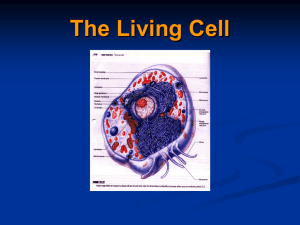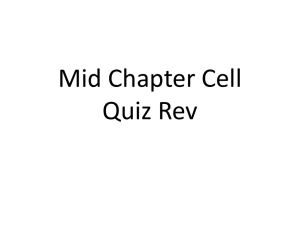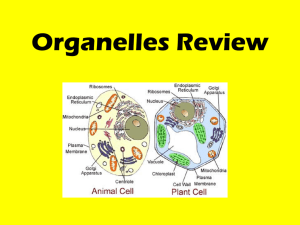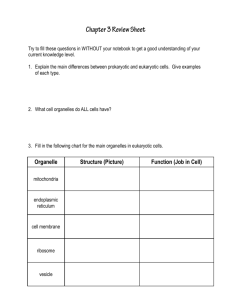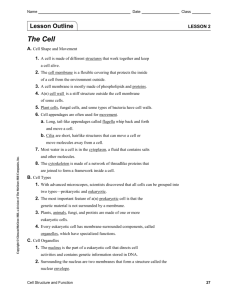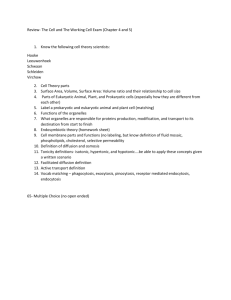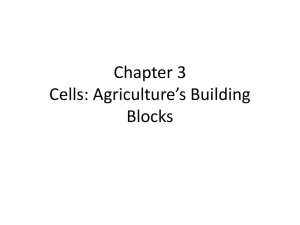Unit 9 Cell Jeopardy 2015 Review
advertisement
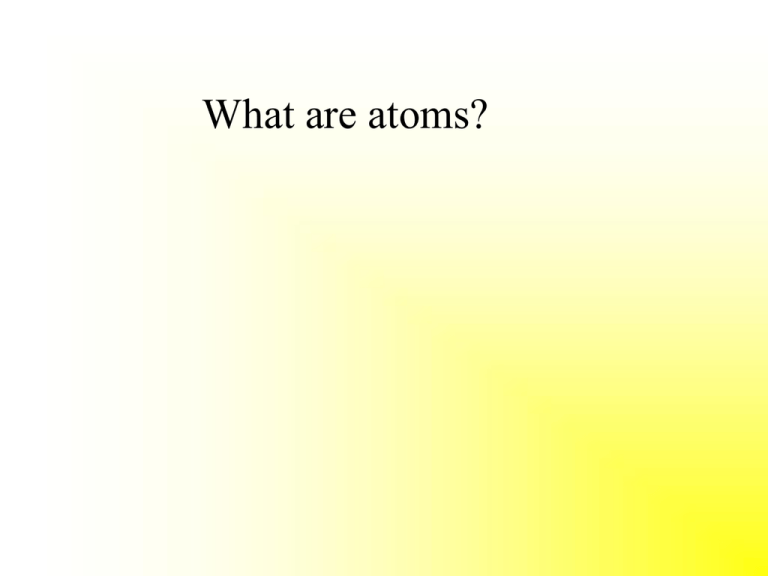
What are atoms? The building blocks of all matter What are cells? Cells are the basic building blocks of life. (different than atoms which are the basic building blocks of all matter!) What are organelles? Organelles are the organs inside a cell. They are what makes the cells work and each have their own job to do. What organelles are in an animal cell? plasma (cell) membrane ribosomes lysosomes ER (rough and smooth) Golgi complex mitochondria cytoplasm nucleus vacuoles nucleolus DNA What organelles are in an plant cell? cell membrane cytoplasm ribosomes vacuoles chloroplasts Golgi complex DNA Mitochondria nucleus cell wall ER (rough and smooth) nucleolus What are the four common features of all cells? All cells have: 1) cytoplasm 2) DNA 3) ribosome 4) cell membrane. What is the difference between eukaryotic and prokaryotic cells? Eukaryotes do have a nucleus and membrane bound organelles Prokaryotes don’t have a nucleus nor membrane bound organelles What is the difference between unicellular cell division and multicellular cell division? • The cells of unicellular organisms divide to reproduce. • The multicellular organisms divide to replace cells and to grow. Why do cells need specialization? Cells specialization only occur in multicellular organisms. Multicellular organisms have many cells, that must work together for an organism to live. Each organelle has their own jobs. What are the three parts of the cell theory? • Cells are the basic unit of life. • All living things have cells. • Only cells can make other cells As we get bigger, what happens to our cells as we grow (like from a baby to a middle schooler?) As you grow your cells do not grow, they divide, creating more cells. That means you have more cells when you are in Middle School, than as an infant – not bigger cells. What are the four macromolecules in a cell?? proteins lipids nucleic acids carbohydrates Which of the four macromolecules is a fat? Lipids and they store energy for later use. Which of the four macromolecules supplies energy for cell process and can mix with water? Carbohydrates Why are nucleic acids important? They have all the instructions for the cell Which of the four macromolecules is hydrophobic? Why? Lipids – fats don’t mix well with water (hydrophobic means afraid of water) What macromolecule are cell membranes made of? Lipids In which plant organelle does photosynthesis take place? Chloroplast What does homeostasis mean? The maintenance of a constant internal state in a changing environment. How does a cell perform homeostasis? A cell wants to keep everything working perfectly and keep everything even. *If the concentration of substances inside a cell is higher than concentration outside the cell. Meaning, there is more water inside cell than outside. Water moves to the outside of the cell to even out the concentrations. If the concentration of substances is lower outside the cell than concentration inside the cell. Meaning, there is more water outside the cell than inside. Water moves into a cell to even out the concentration. How can you tell if something is alive or not? If something has cells it is alive or was alive at one time Why do cells divide? To replace damaged cells and to help the organism grow What organelles do plant cells have that animal cells do not? Plant cells have chloroplasts and a cell wall What organelles do you find in both eukaryotic and prokaryotic cells? They are the same except – Prokaryotic cells do not have a nucleus Draw and label an eukaryotic animal cell Draw and label an eukaryotic plant cell Draw and label a prokaryotic bacteria cell?


